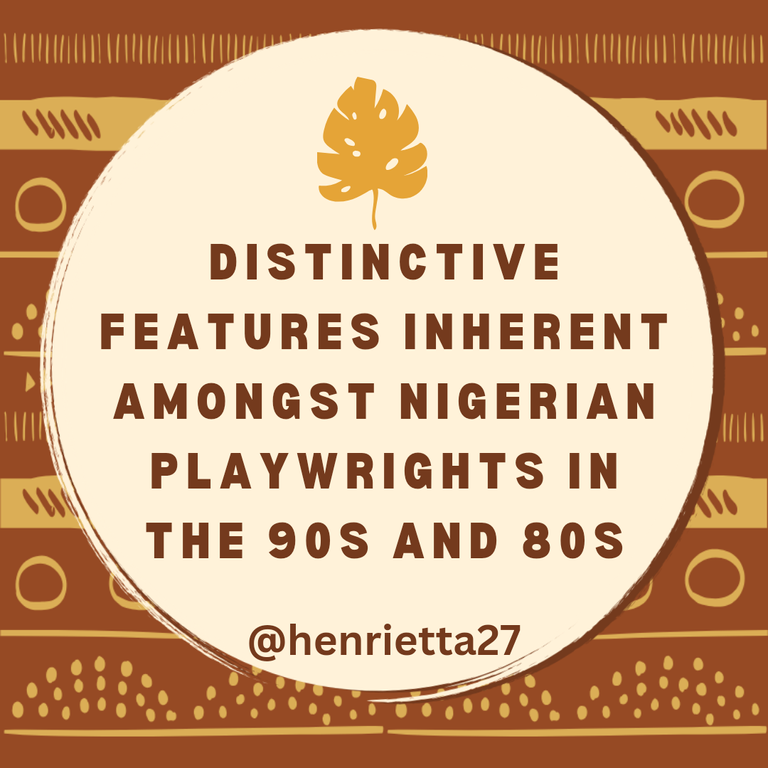DISTINCTIVE FEATURES INHERENT AMONGST NIGERIAN PLAYWRIGHTS IN THE 90S AND 80S

Cover image was created using canva
Nigeria is blessed with playwright that have emerged since before Nigeria got her Independent and these authors use their words strategically to explore the experiences of Nigeria during those times. Looking back at our curriculum then in high school, we encountered the likes of Wole Soyinka, Zulu sofola, ola Rotimi, Femi Oshofisan, Chinua Achebe and many more. These playwrights were so unique and brilliant with their works that they are still relatable and made reference to in modern day seminars, papers, conference, projects, books and so on. Their style of writing was mostly based on the then archaic colonial style, most plays were an adaptation to foreign plays used to capture the traditional Nigerian context.
During this period,authors employed themes that covered the range of contexts such as politics, cultural identity, human rights, activism, modernization,spirituality,religion, social injustice, gender roles, traditions and so much more. Back then and even now, Nigeria can be described as a complex nation with a multifaceted nature, all the political brouhaha coupled with the acceptance of modernity, religion, cultural identity and all gave these writer a platform to use the medium or literature through writing of plays to reduce the tension and give room for social critiques.
There are some books that I am familiar with that explains the life and times of Nigerians in the 80s and 90s. My favorite authors from the 1950s is Wole Soyinka, can vividly remember his book titled the Lion and the Jewel which was a play written in 1959. This book is considered as a classic African literature that employees the eminent effect of power struggle between the old and the Young. It's all about a young lady who is in love with a fellow young man but unfortunately, an elderly man who is a traditional chief later married the girl because he had more power and was influential.
Another playwright that made waves during the 90s was Femi Oshofisan's "the women of owu". This play was basically about women and the violence they faced during the war where all the men in the community were killed. This play basically narrates the events that the women had to go through in terms of fighting for themselves we building their homes morning the loss of their husbands raising their children single-handedly and also preparing for further violence brought upon them. General the playwright uses this book to narrate the consequences of war back in the days hence it touches the themes of resilience, survival, braveity and the impact of war on a community or a nation.
Lastly one of my favorite books that was produced back there was the play by ola rotimi "the gods are not to blame", this was evidently and adaptation of offering literature titled "Oedipus rex". The story was all about tradition mixing up with modern beliefs and values, in traditional Yoruba belief, there is something called destiny where a child fate is believed to have been written and whatever the outcome is cannot be changed. The protagonist however wanted to break free and defy traditional values by exploring the modern style of free will but this led to tragedy.
It is evident that playwrights were prominent in the 80s and 90s for their unique style of writing, most of these plays were acted out on stage and theatres in schools university campus where they mixed traditional settings with a touch of modern style of theater.
The April inleo prompt has commenced for the new month, it's an opportunity to take on topics of your choice and write on them. Check the link above to participate.
Thank you for stopping by my blog...
Posted Using InLeo Alpha
Congratulations @henrietta27! You have completed the following achievement on the Hive blockchain And have been rewarded with New badge(s)
Your next target is to reach 50000 upvotes.
You can view your badges on your board and compare yourself to others in the Ranking
If you no longer want to receive notifications, reply to this comment with the word
STOP